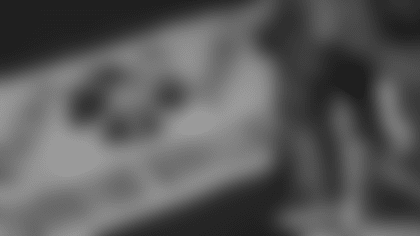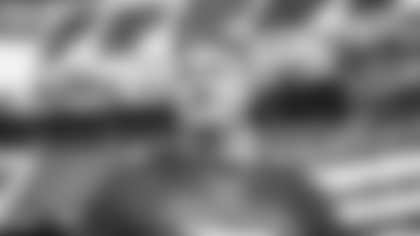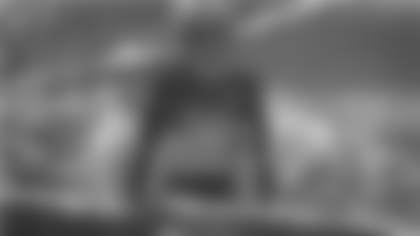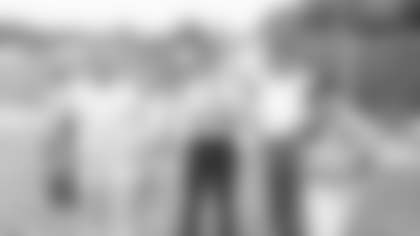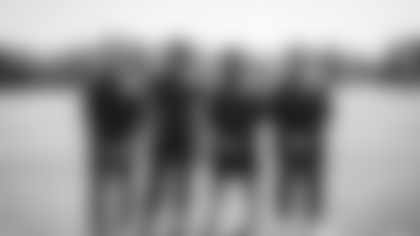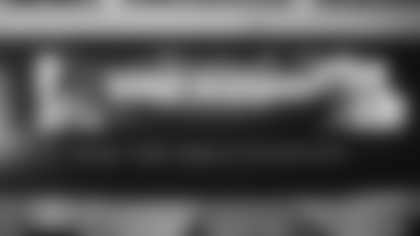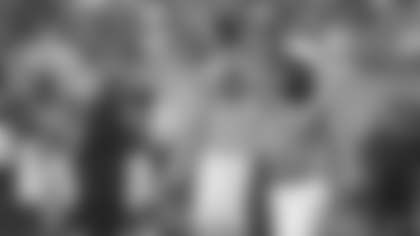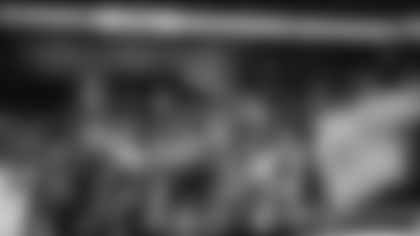There is a moment inside the office at Ashburn, Virginia that Tavita Pritchard picks up the purple cloth that he had placed on the table when he first walked into the room and ties it around his waist.
"I'll throw this on around the house," he says as he swings the cloth around him. "I try to wear this so my kids see it. You would definitely need to wear this any time you were doing anything fa'a-Samoa (the Samoan way). So, if we were doing a lū'au, or for a wedding or funeral, there's a dress version of this too called a 'le Faitaga, which has pockets…but yeah, I'll wear it over pants."
The pants today are Nikes. The gold of the Commanders logo on them just happens to complement the gold that bears his family name on the lavalava he has fastened.
Pritchard returns to sitting as the conversation oscillates from the origins of the West Coast offense to his childhood growing up in Tacoma, Washington, from practice sessions in Seattle with his uncle to the dancing that took place on his wedding day. Football. Samoan heritage. And back again.
The vignettes weave together like a double helix, intersecting symbolically in an image of an NFL coach leaned back in his chair wearing a garment his ancestors first wore thousands of years ago. The single scene captures so much of what has long been most important to Pritchard.
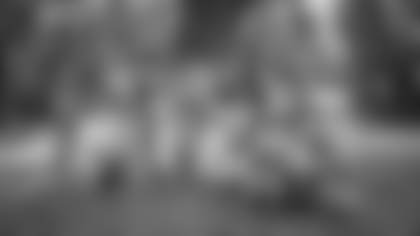
Tavita is not the first of his family to live in Virginia. In fact, the state is where the Pritchards' American story begins. Tavita's paternal grandfather Keila Pritchard, who was born and raised in Samoa, was first stationed in Virginia when he joined the army.
After a few stops around the country, Caleb and his little family laid roots in Washington state. Here, the Pritchard family grew, and their home developed into a haven of sorts for the growing Samoan population in the area.
"My dad's house when he was growing up became almost like a hub for all these Samoan guys who had joined the army and then came to Washington. It became kind of like, 'Oh, go to Pastor Caleb's house' and that was their way of getting their feet underneath them in the United States," Pritchard said, "It was a home base of sorts for that Samoan culture but at the same time, he [Caleb] was very encouraging of like, 'Don't speak Samoan. Speak English.'"
Finding the balance between both -- the American and the Samoan -- was an issue that a couple of Pritchard generations grappled with in the Pacific Northwest.
"As I'm sure is the case with a lot of immigrant families, they had this really interesting tension between assimilation and preserving their traditions," Pritchard said.

It was here -- processing these questions around identity and place -- that football took on an impactful role. And it wasn't just for the Pritchards. Many Samoan Americans found opportunity and interest in this "red-blooded American" sport.
"I think one of the big reasons our people gravitated to it and took to it early on is because it's the ultimate team sport. And for Samoans, everything is so community driven. Everything is about the whole," Pritchard said. "When you think about a football team, and what it takes to be successful, it's giving yourself up to the team and doing what's best for the team."
Other values such as a respect for hierarchy and elders perhaps also translated nicely. Then, add in the physical element. Positions across the defensive and offensive lines turned out to be a solid fit for many Samoan Americans with strong, hefty builds.
Tavita's uncle Jack Thompson, however, opted for a different spot when he started playing the sport: quarterback. After a record-breaking career at Washington State, Thompson was affectionally dubbed the "Throwin' Samoan." He went on to become the No. 3 pick in the 1979 NFL Draft and perhaps his nephew's biggest football influence.
"Before there were quarterback gurus, my Uncle Jack taught me how to play," Pritchard said. "I would drive up to Seattle to go work out with him and his cousin every weekend. One of the big things Uncle Jack taught me other than just throwing and drops was the mentality of playing quarterback."

Pritchard chose to wear the No. 14 throughout his career because it was the number his uncle wore. And while he never received a nickname that put his heritage in the spotlight like Thompson did, Pritchard calls attention to Samoan influences in his game.
"They [football and his heritage] are very intertwined. Being able to access things like self-sacrifice and the whole is bigger than the individual, those are things that are very, very real to me," Pritchard said. "And respect for authority but also being able to ask questions and push ideas forward. I think that's how my culture shows up in my coaching. I think I have a strong foundation of some of those principles."
Now as a father himself, passing down those Samoan principles and knowledge of Samoan culture has become a priority. He has three kids, all of whom have Samoan names, and a baby on the way. During the pandemic, he started studying Samoan more. He will wear the lavalava around the house, and in general, just looks for learning moments to teach his kids about their heritage.
"We talk a lot about our ancestry, and I'll get really corny with you, but even like the themes and elements from the movie 'Moana'," Pritchard said. "I talk about how our people were way finders and they set out on canoes, about what lives inside of them, the boldness to go venture out and do something. So that's tangible for my kids."

When it comes to culture and heritage, 'survival' has taken on different meaning for Tavita now than it did when the Pritchards were first settling in the US. He appreciates and understands what his elders did to ensure the family could make a home here. He benefited greatly from the nudge toward assimilation.
Today though, priorities have shifted. Pritchard, as a second-generation American who grew up around so much fa'a-Samoa, has thought a lot about the legacy he wants to leave behind.
Every time he listens to his six-year-old son talk about how many Samoan men have long hair like he does, every time he gets to talk about his family's story with his kids, Pritchard feels how essential this passing down of heritage is.
"It means everything…So much of Caleb Pritchard's experience and my dad's experience was yes trying to keep our culture alive, but it was definitely a lot of "Speak English. Be American. Go that way" because as parents, you want your kids to be successful," Pritchard said. "For me now though, I'm trying to reach back and pull a lot of those Samoan things forward because I don't want them to die."
![Image[31]](https://static.clubs.nfl.com/image/private/t_editorial_landscape_mobile/t_lazy/f_auto/commanders/x5b4xktprghcyabhnuqt.jpg)



